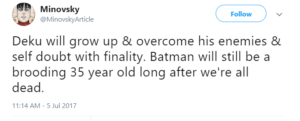(This column is posted at www.StevenSavage.com and Steve’s Tumblr. Find out more at my newsletter.)
My fellow author Serdar was discussing the importance of art and entertainment over at his blog. This struck me as very important:
“I think any act of creativity can be used by others as escapism, a way to — how did someone else put it? — ignore everyone else’s reality and substitute their own. Most of us do this to some extent or other anyway, so I see little point in wringing hands about it. The smarter thing to do, maybe the only thing that can be done, is create things that are good enough, constructive enough, universally enriching enough, that people will want to make them real — not just for themselves, but for others — in whatever way they can.”
Serdar speaks to the importance that artists can help people realize better worlds, because first they need to be imagined. Once imagined, you can work on making those glorious visions real, and even if you never succeed, you may get far enough to help us all get closer to the dream. Life is, after all, a relay race not a sprint.
Just think of how many of us were inspired by Star Trek to build a better world. However, art is not always about positive experiences, but they always have the chance for being transformative. As Sam Sykes put it:
The role of the artist in the world is the role of the Bard in many fantasy games – the person who enhances and buffs, enriches, and supports. A Bard does that which helps others do things better.
The bard metaphor speaks to me because my works are often supportive works (such as my guides), but also because inspiration takes many forms. A horror story may not create a vision for a better world, but it does give one experiences that can be enriching or thought-provoking. The artist creates not just visions, but explorations, tools, and inspirations – not all of which are or need to be pleasant. But, like the Bards of fantasy games, the artist changes you and enhances you.
Right now you doubtlessly have a book, game, comic, or other thing to make. You may, like many of us, pause to ask if it’s worth it. I would turn it around and ask two things: do you enjoy doing it and will someone get something out of it?
If you enjoy it, go for it. Your enjoyment WILL make the work interesting to people, and if nothing else someone takes pleasure from it and gets a break.
If people can get something out of it, go for it. It will help and enhance others.
You may say “but wait, there’s no reason not to create!”
Yes. Exactly. You got it.
Steven Savage
